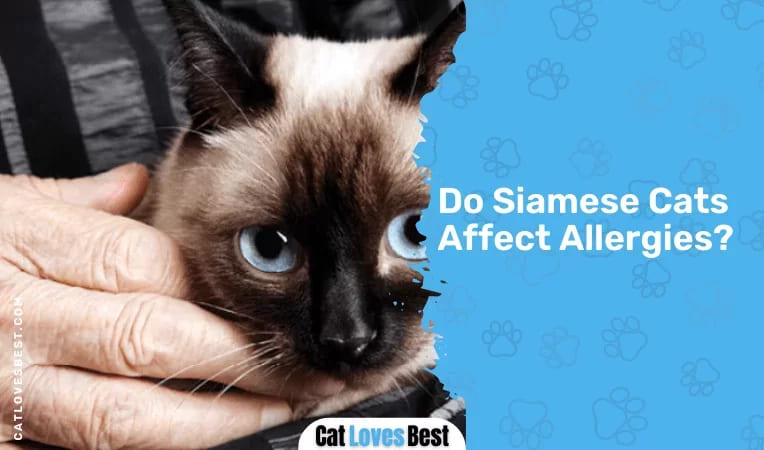Are you looking for a cat that is hypoallergenic? Don’t worry, I got your back. Did you know that around 10% to 20% of the population is allergic to cats?

If you are one of them, but cannot resist buying a furball. Then you can go with Siamese, which is considered a “hypoallergenic cat breed”.
However, none of the cat breeds is 100% hypoallergenic, but few can reduce the chances of allergies. There are many factors that you need to keep in mind to reduce the chances.
Let’s get into this article to find out that Siamese is a perfect choice for those who have cat allergies.
Are Siamese Cats Hypoallergenic?
For many years, people thought that there are hypoallergenic pets that wouldn’t affect their allergies. However, it is not entirely true, if you look around there are truly no hypoallergenic cats or dogs.[1]
If you find, you might find some cats that will have less effect on your allergies than others.
When we look around, then we will find that only 10% of the population are allergic to cats and other pets. There are many reasons that people are allergic to cats, many people think it is because of hair.
However, hair might be a possible reason, but in most cases, you will see people are allergic to an allergen that’s contained in feline saliva. The saliva allergen is also called Fel d 1, one of the major cat allergens. [2]
Now as I told you before, there are no cat breeds that are completely hypoallergenic, yet few cats are known to be much less irritating for people with allergies.
That being said, it is possible that some breeds might release less of the allergen. So people might find it is a hypoallergenic cat.
Why Siamese Cats are Considered Hypoallergenic?
If we talk about Siamese cats then yes, they are considered hypoallergenic. However, their coat is on the higher side, so the dry scalp is captured which prevents allergic reactions.
That being said, the main reason why the Siamese cat is considered hypoallergenic is they produce less Fel d, which is responsible to prevent allergic reactions.
Hypoallergenic Qualities in Cats
Long Haired
There is a myth among cat owners that having cats that have shorter hair is hypoallergenic than having long-haired cats.

The research actually proves different, Since you know that only 10% of people are allergic to cats. From which a few of them are allergic to cat hair, so the length of a cat’s hair shouldn’t matter that much.
The researchers have found that the Fel d 1 protein is contained within the skin and hair. This means it is always better to have long-haired cats, it prevents the protein to released into the air and onto the things available in the house.
Low Shedding
The best way is you can buy a cat that shed less, which will reduce the Fel d 1 protein in the atmosphere.

That being said, it makes sense that buying a low-shedding cat is better hypoallergenic qualities than other cats.
Female
Research suggests that female cats produce less amount of Fel d 1 than males. A female cat is preferable to a male cat for people who are allergic to cats.[3]
Outdoor
The main possible reason might be people avoid cats from going out. There are considerations that if the cats go outdoor then they might spray and urine around their territory.
If your cat is going out, then they might shed excessive hair. Moreover, if the cat has the access to go out of the house. Then it might be good for you, they will spread the Fel d 1 protein without bothering you.
How to Deal with Cat Allergies
Let’s suppose that you are allergic to cats. You can go with the siamese cat as a pet. Here you go check out some of the precautions that can take. This might help you reduce allergic reactions.
First thing if you are buying a Siamese cat, you can set scheduled grooming every weekend. The grooming will release the Fel d 1 allergen from the skins and fur, reducing the chances of a heavy dose.
Moreover, you can tell your family member to groom your cat every weekend outside the house. This will help to keep the allergens outside the house, and less allergen will spread inside the house.

If you are regularly bathing your cat then it will reduce the amount of allergen present on their body. Moreover, it will keep them healthy and smell good. You should make sure that use the distilled which is good for their fur and coat.
Second, you will have to keep in mind that you wash your hand after touching your furball. It will reduce the direct contact with the allergen in your system.
The third thing is you should clean your house. You can do the vacuuming daily where you often sit or sleep. It will reduce the number of allergens within that space. You can get an air purifier, which will also remove some amount of allergens from the air.
Do Siamese Cats Affect Allergies?
No, Siamese cats are one of the cat breeds that release less of the Fel d 1 allergens. As Siamese is known for shedding only a minimal amount, that’s the reason they are called the “hypoallergenic cat” breed.
As you might know that cats groom themselves a lot, and they love hygiene. This is the most crucial time when they spread the Fel d 1 allergen around they are sitting.

The fact is all the cats do produce the Fel d 1 allergen. For those who are highly sensitive to Fel d 1 protein then none of the cats is suitable for them.
The Siamese cat affects your allergies depending on your sensitivity levels. If you are not allergic that much then you can Siamese is one of the best breeds for you than other breeds.
FAQs
Do Siamese cats have less dander?
The Siamese shed very less, also it has short hair, which is less noticeable than long-haired cats. The Siamese cats produce a very less amount t of Fel d 1 protein than other cats. So if you are not too sensitive then you can go with the Siamese Hypoallergenic cats.[4]
Do Siamese cats shed a lot?
No, Siamese cats do not shed like other cats, that’s the reason they are considered hypoallergenic cats. Still, you can vacuum the house, as the cats do spread the Fel d 1 protein allergen while they are grooming.
Are Siamese cats good for first-time owners?
You should keep this in mind before you are buying a cat as a pet. You should know the cat’s age, activity levels, grooming requirements, food timing, and affection needs.
You might find multiple different types of cats in the market. However, Siamese is one of the best breeds you can get, because it has very less maintenance, and requires less grooming.
Final Thoughts
The Siamese cat really fits in the typical definition of a “hypoallergenic” cat. If you are not sensitive too much to an allergen, then you can go with the Siamese cats. As they produce less amount of Fel d 1 protein.
Now you may know that non of the cat in this world os 100% hypoallergenic. Still, you can get cats like Siamese which have less amount of Fel d 1 allergens.
I hope that you found this “Are Siamese Cats Hypoallergenic?” article helpful. I hope that you got some useful tips that you can use to avoid the spread of allergen around your house.
If still, you have any doubts related to Siamese Cats or hypoallergenic then you can comment down below, I will get back to you asap.
References:
- Butt, A., Rashid, D., & Lockey, R. F. (2012). Do hypoallergenic cats and dogs exist?. Annals of Allergy, Asthma & Immunology, 108(2), 74-76.
- Bonnet, B., Messaoudi, K., Jacomet, F., Michaud, E., Fauquert, J. L., Caillaud, D., & Evrard, B. (2018). An update on molecular cat allergens: Fel d 1 and what else? Chapter 1: Fel d 1, the major cat allergen. Allergy, Asthma & Clinical Immunology, 14(1), 1-9.
- Jalil-Colome, J., de Andrade, A. D., Birnbaum, J., Casanovab, D., Mège, J. L., Lanteaume, A., … & Vervloet, D. (1996). Sex difference in Fel d 1 allergen production. Journal of allergy and clinical immunology, 98(1), 165-168.
- Ohman, J. L., Jr, Lowell, F. C., Bloch, K. J., & Kendall, S. (1976). Allergens of mammalian origin V. Properties of extracts derived from the domestic cat. Clinical allergy, 6(5), 419–428. https://doi.org/10.1111/j.1365-2222.1976.tb01926.x

